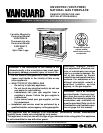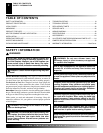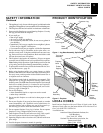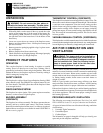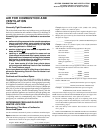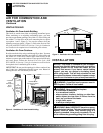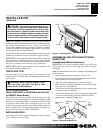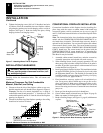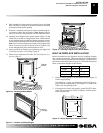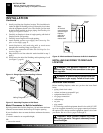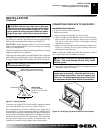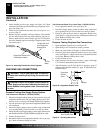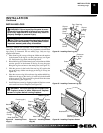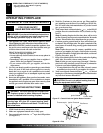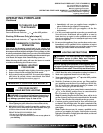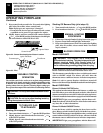Special offers from our partners!

Find Replacement BBQ Parts for 20,308 Models. Repair your BBQ today.

107157-01F
4
For more information, visit www.desatech.com
For more information, visit www.desatech.com
Today’s homes are built more energy efficient than ever. New
materials, increased insulation, and new construction methods help
reduce heat loss in homes. Home owners weather strip and caulk
around windows and doors to keep the cold air out and the warm air
in. During heating months, home owners want their homes as
airtight as possible.
While it is good to make your home energy efficient, your home
needs to breathe. Fresh air must enter your home. All fuel-burning
appliances need fresh air for proper combustion and ventilation.
Exhaust fans, fireplaces, clothes dryers, and fuel burning appliances
draw air from the house to operate. You must provide adequate fresh
air for these appliances. This will insure proper venting of vented
fuel-burning appliances.
PRODUCT FEATURES
OPERATION
This vent-free fireplace is clean burning. It requires no outside
venting. There is no heat loss out a vent or up a chimney. Heat is
generated by both realistic flames and glowing embers. When used
without the blower, the fireplace requires no electricity making it
ideal for emergency backup heat.
SAFETY DEVICE
This fireplace has a pilot with an Oxygen Depletion Sensing (ODS)
safety shutoff system. The ODS/pilot is a required feature for vent-
free room heaters. The ODS system shuts off the fireplace if there
is not enough fresh air.
PIEZO IGNITION SYSTEM
This fireplace has a piezo ignitor. This system requires no matches,
batteries, or other sources to light fireplace.
BLOWER ASSEMBLY
(VSGF28NTC)
This fireplace has a blower assembly. The blower operates thermo-
statically and has a variable speed control. The blower circulates
heated air from the fireplace into the room. Use of blower is optional.
Optional blower accessories are available for model VSGF28NVA.
See Accessories, page 22.
UNPACKING
1. With utility knife, cut the carton all the way around above the
staples on the bottom tray. Lift the carton off the heater. Re-
move packing.
Note:
The hood is located in the packing on
the right hand side of the heater front. Lift the heater off the
bottom tray.
2. Locate two screws above top corners of the fireplace screen.
Remove and discard these screws. Lift fireplace screen up and
pull out to remove.
3. Remove protective packaging applied to logs, log base assem-
bly, and fireplace.
4. Remove fireplace hood from carton insert.
5. Check all items for any shipping damage. If damaged, promptly
inform dealer where you bought fireplace.
WARNING: Do not remove the data plates at-
tached to the heater base assembly. The data plates
contain important warranty and safety information.
THERMOSTAT CONTROL (VSGF28NTC)
This fireplace has a thermostat sensing bulb and a control valve. The
thermostat controls the heat output and flame height. This maintains
a consistent room temperature. Even the lowest setting provides
realistic flames and glowing embers from two burners. Selecting
higher comfort settings allows fireplace to run longer, producing
greater heat output. At lower comfort settings, the fireplace will run
less. This results in increased heating comfort. This can also result
in lower gas bills.
VARIABLE MANUAL CONTROL (VSGF28NVA)
This fireplace has a variable manual control valve which allows the user
to choose the heat setting that best suits his needs. Any setting between
low and high may be selected by simply turning the control knob.
AIR FOR COMBUSTION AND
VENTILATION
WARNING: This heater shall not be installed in a
confined space or unusually tight construction un-
less provisions are provided for adequate combus-
tion and ventilation air. Read the following instruc-
tions to insure proper fresh air for this and other
fuel-burning appliances in your home.
UNPACKING
PRODUCT FEATURES
AIR FOR COMBUSTION AND VENTILATION
Providing Adequate Ventilation
PROVIDING ADEQUATE VENTILATION
The following are excerpts from National Fuel Gas Code, ANSI
Z223.1/NFPA 54, Section 5.3, Air for Combustion and Ventilation.
All spaces in homes fall into one of the three following ventilation
classifications:
1. Unusually Tight Construction
2. Unconfined Space
3. Confined Space
The information on pages 4 through 6 will help you classify your
space and provide adequate ventilation.



